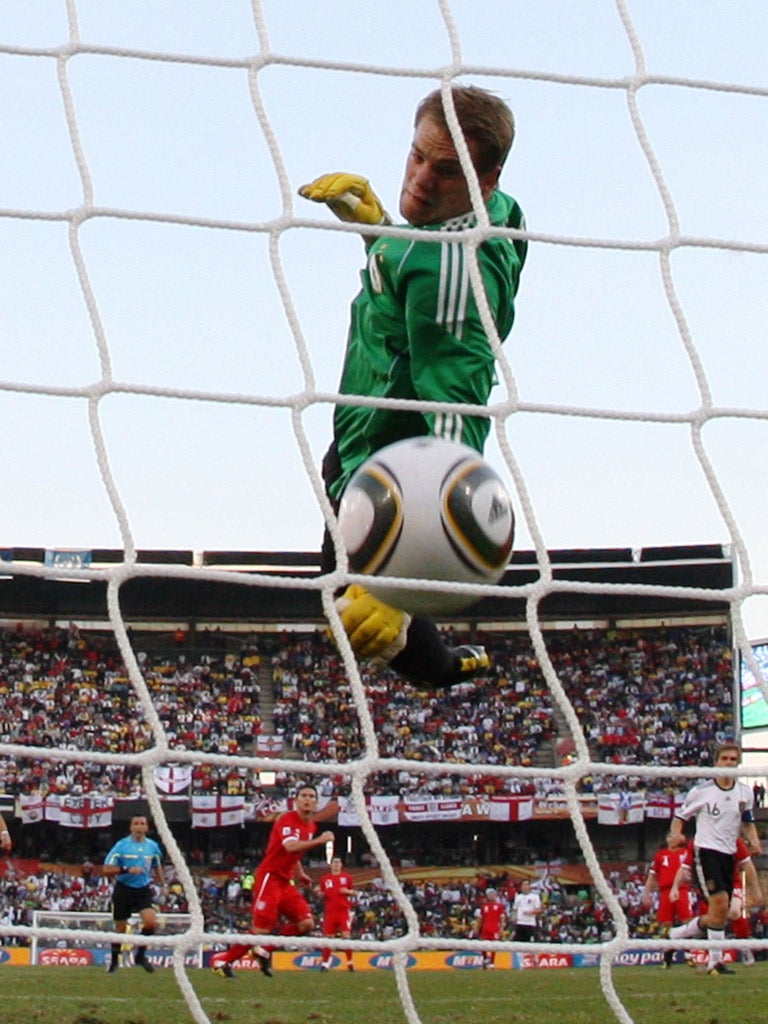Better late than never: goalline technology gets international clearance
New systems to be used at Club World Cup, with Premier League eager for early introduction

Almost half a century after Geoff Hurst's controversial goal helped England win the 1966 World Cup, the use of goalline technology was finally approved yesterday.
Although a majority of clubs, players, fans – and even the referees themselves – have long been pushing to bring football into the 21st century, the ultra-conservative International Football Association Board has repeatedly stepped back from the brink but is now convinced that both methods to have undergone rigourous testing – the camera-based Hawk-Eye system used in cricket and tennis and GoalRef, which uses a magnetic field – are foolproof and can decide within one second whether a goal has been scored without holding up play.
Both systems will first be used at December's Club World Cup in Tokyo, where Chelsea will be one of the teams, and, if successful, at the 2013 Confederations Cup and, crucially, the 2014 World Cup. "We welcome today's decision by IFAB and will engage in discussions with both Hawkeye and GoalRef in the near future with a view to introducing goal-line technology as soon as is practically possible," a Premier League statement said.
At a news conference following a three-hour special meeting of the IFAB in Switzerland, the Football Association general secretary, Alex Horne, confirmed that the Premier League could be among the first to use one or both systems after what he hailed was a "hugely important day" for football.
"The Premier League need to talk to the two [systems] and the clubs," said Horne. "My understanding is that clubs are supportive and, in principle, as long as all clubs agree it could be introduced part-way through the season, it could be before the start of 2013-14 season, it could be part way through. It might be that it is possible to have it part way through the [2012-13] season."
Sepp Blatter, the Fifa president ,once strongly against technology, changed his mind following Frank Lampard's disallowed effort for England against Germany in the 2010 World Cup. Blatter is now a firm advocate of technology being in place before the next World Cup in Brazil and reiterated that stance after Ukraine were denied a perfectly good goal against England in their final group game of Euro 2012.
While Wales and Northern Ireland were initially against goalline technology, they are now firmly on board after yesterday's unanimous ruling. "This is an historic decision that will resonate around the world," said Patrick Nelson, chief executive of the Irish FA while his Welsh counterpart Jonathan Ford said it was a "momentous" move.
"Over the past few years there have been a number of occasions where mistakes have clearly occurred in football," said Scottish FA chief executive Stewart Regan. "Anything that can assist the referee in making the correct decision has to be good."
The landmark ruling by the IFAB will be a bitter pill to swallow for Uefa president Michel Platini, a fierce opponent of goalline technology who favours the alternative scheme of an extra official behind each goal.
Platini believes it would be an "historical mistake" if technology replaces human judgement and that it would serve as a dangerous precedent in terms of spreading to video replays for other contentious decisions like offsides and penalties. But the Frenchman suffered embarrassment during England's 1-0 win over Ukraine when the extra official, standing 10 yards away, failed to spot that Marko Devic's shot was clearly over the line.
Platini did win one concession yesterday when the IFAB also formally approved the introduction of additional assistant referees after two years of experimentation in the Champions League, Europa League and Euro 2012, allowing competition organisers to run with which ever system they want.
Join our commenting forum
Join thought-provoking conversations, follow other Independent readers and see their replies
Comments
Bookmark popover
Removed from bookmarks